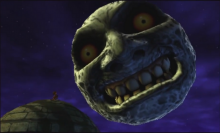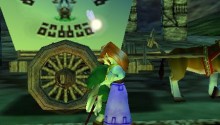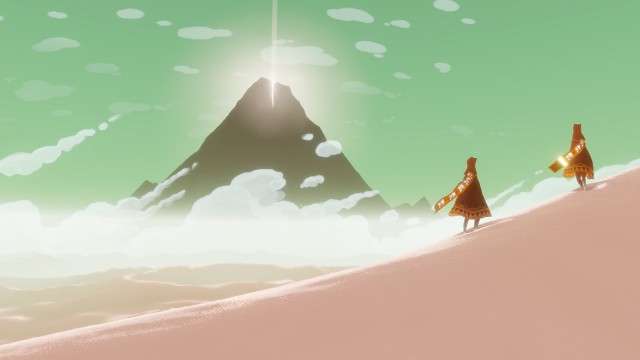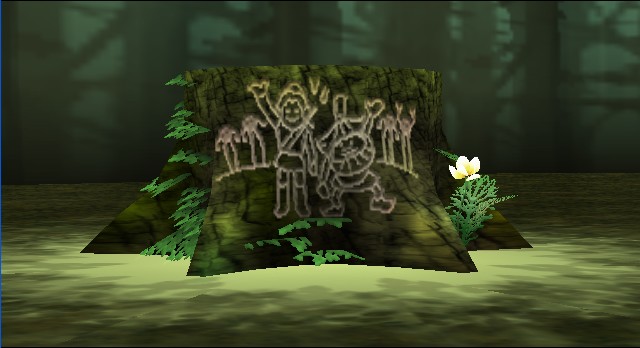Building Meaning in Majora’s Mask
Posted on December 11 2014 by Jack Peacock
 Next spring many of you will begin adventuring through the fully three dimensional world of Termina! Some will be adventuring there for the 100th time, while many others will be having their first taste of it. And what an experience awaits those first timers!
Next spring many of you will begin adventuring through the fully three dimensional world of Termina! Some will be adventuring there for the 100th time, while many others will be having their first taste of it. And what an experience awaits those first timers!
Majora’s Mask is a game that has really managed to connect deeply with a lot of people. For me personally, Majora’s Mask ranks as the most emotionally involving game I’ve ever played, and I know I’m not the only one to say this. There are many reasons why it has affected people the way it has, and with its remake only a few months away, I thought now would be a good time to review some of them.
So exactly what did Majora’s Mask do to have the effect it did? A tremendous amount has been written about the game and, somewhat paradoxically, this can make it difficult to see how to approach it. So let’s just start with the basics: the game’s narrative and how it was constructed to offer meaning.
A lot of the mechanics of Majora’s Mask are the same as its predecessor, Ocarina of Time, which didn’t have nearly the same effect on me. The formula in Ocarina of Time goes something like: solve the puzzles, defeat the enemies etc. to progress through a dungeon, beat the end boss, find the entrance to the next dungeon, repeat till the end. It is the typical formula for the series and, while its structure appears simple enough, it allows for endless creativity and variation. The game has a general framing narrative, and many smaller narratives that interact with the larger one. Its narratives pull the game together and make it coherent. The narrative the game creates can be interesting and engaging, just as progressing through the game’s stages can also be interesting and engaging. In many ways this is much the same as Majora’s Mask, but what Ocarina of Time lacks in comparison is some ‘meaning’ in its narrative, it lacks an engaging human dimension.
 All the different parts of a game contribute to building a narrative. The player progresses through the game and stitches together the different elements of gameplay and story etc. that they experience to construct this. The interesting question is, how can we construct it such that it has some meaning for the player? How do you make it such that the player connects with the world emotionally?
All the different parts of a game contribute to building a narrative. The player progresses through the game and stitches together the different elements of gameplay and story etc. that they experience to construct this. The interesting question is, how can we construct it such that it has some meaning for the player? How do you make it such that the player connects with the world emotionally?
Ocarina of Time uses many brilliant design ideas to shape the player’s experiences, but the focus of all this is still mostly on the player solving puzzles and fighting enemies, elements which don’t themselves necessarily have any meaning. The game’s framing narrative is one of the evil dictator controlling the land. Yet, any cruelty towards the populace on Ganodorf’s part, and suffering from Hyrule’s people, is not a subject of the narrative’s focus. It chooses not to look at people and their human struggles; it does not look at individuals and their goals or ambitions. It sets itself up more simply as a battle between good and evil, or ‘us’ against ‘the monsters’.
Ocarina focuses on the great catastrophe befalling the land and asks you to go put a stop to it. Link is tasked with saving the world, but the game never really connects us to the problems of the world in need of fixing. It sticks to the grander story, rather than the more intimate ones. Yet most of us don’t tend to feel so much for the catastrophe itself, as for the poor old woman struggling to find bread because of it.
The most important thing Majora’s Mask does differently is to build narratives around people and their interactions. It develops itself more in the overworld, and shows more interactions with non-playable characters. It has people worrying about their lives, and other things they care about, things that have meaning to them. Its framing narrative is one of a world about to end in a few days, it is set around a coming apocalypse. But in much of the players interactions, this is not the focus. The more everyday, personal struggles of the world’s inhabitants play a far larger role. The coming end of the world shapes how those characters behave, but rather than simply worrying for their world, they focus on more intimate human concerns.
 There are two lovers separated by a curse and a stolen mask, a now skeletal captain who can’t bring himself to accept that the war has ended, a music player racked by guilt at his thievery, a postman whose sense of duty means more to him than his life, and a ranch owner grateful when you help her escape the bandits and deliver her milk to town. I could go on with many more. The game is full of small stories and human concerns, which the player can interfere with to make right. These small stories all play out and interact with the larger narrative, and lend it a more human meaning.
There are two lovers separated by a curse and a stolen mask, a now skeletal captain who can’t bring himself to accept that the war has ended, a music player racked by guilt at his thievery, a postman whose sense of duty means more to him than his life, and a ranch owner grateful when you help her escape the bandits and deliver her milk to town. I could go on with many more. The game is full of small stories and human concerns, which the player can interfere with to make right. These small stories all play out and interact with the larger narrative, and lend it a more human meaning.
What makes a thing meaningful is of course how people relate to it: it’s the human conception of the world that gives rise to meaning. It is a person stood amid that world, who thinks and feels and acts within that world, it is a person who has purpose, desires and dreams that generates meaning. People and their interactions are thus at the center of meaning making.
Thus, a narrative that focuses on people and their personal struggles naturally has meaning built in to it, and allows us to more easily connect to it. I feel a nice example of this is illustrated by two other, non-Zelda, games: thatgamecompany’s Flower and Journey for the PS3. Those who have played both will no doubt have noticed their similar structure: a bright free opening section, which gets more difficult before the player descends into a darker, more dangerous world where they risk losing some of their petals/ scarf. The player marches through this difficult foreboding trial before ending the game with a soaring, upwards moving final sequence.
 Both games have a lot of charm, but it is Journey that has largely proven to be the more emotionally involving of the two. The reason for this, I believe, is mostly due to the fact that flower has its narrative focused on wind and flowers, the comings and going of inanimate objects, while Journey focuses on a human struggle. Journey had the player take the role of a robed figure, one who had a clear purpose and goal (reach the mountaintop). This person, with their personal goals, instantly adds something that allows people to more easily connect emotionally with the narrative. It gives it some more meaning to latch onto.
Both games have a lot of charm, but it is Journey that has largely proven to be the more emotionally involving of the two. The reason for this, I believe, is mostly due to the fact that flower has its narrative focused on wind and flowers, the comings and going of inanimate objects, while Journey focuses on a human struggle. Journey had the player take the role of a robed figure, one who had a clear purpose and goal (reach the mountaintop). This person, with their personal goals, instantly adds something that allows people to more easily connect emotionally with the narrative. It gives it some more meaning to latch onto.
The Zelda games all have that human person at center, summoned by destiny to stop some evil, and it is certainly true that the series has become more and more story driven, and its world and its characters are, as a whole, more fully developed in later games. This for sure can help construct an engaging narrative, when done correctly, but no Zelda game before or since has really developed in the same sort of way as Majora (I would say here that Link’s Awakening is one game I have a particularly soft spot for, partly because of how its narrative develops, but that is another article). Excepting a few small side stories, they have never tried to base themselves on the sorts narratives in Majora: of people and their ‘human’ struggles. They have always tried to create meaning in other grander, less intimate ways. This I believe is one reason I’ve never felt quite the same way playing another Zelda game.
Of course, the meaning any type of media conveys will always be dependent on the person consuming the media. A film scene will always affect different people differently, just as a game affects different people differently. There are those who felt no emotional impact from Majora, and even some (to my utter bewilderment) who say they didn’t enjoy the game at all!
Majora’s Mask came for me at the right moment, and had all the right ingredients. I was just in the right mood and was receptive to its charms. I was also much younger when I first experienced it, and I understood the world very differently from today. If I were to play it for the first time today, I doubt I would feel quite the same way about it. I reckon I would over-think everything and fail to absorb the meaning within the narrative.
 There is, naturally, a lot more to what made Majora’s Mask, Journey and other games connect with people than what I’ve described. The whole experience is important: the art, the music, the tone and the pacing. But regardless, I feel I can still say that Majora, and Journey, needed those human ingredients to have anywhere near the impact they did, and if any future games manage to have the same sort of effect, it will only be because they too have those same ingredients.
There is, naturally, a lot more to what made Majora’s Mask, Journey and other games connect with people than what I’ve described. The whole experience is important: the art, the music, the tone and the pacing. But regardless, I feel I can still say that Majora, and Journey, needed those human ingredients to have anywhere near the impact they did, and if any future games manage to have the same sort of effect, it will only be because they too have those same ingredients.



